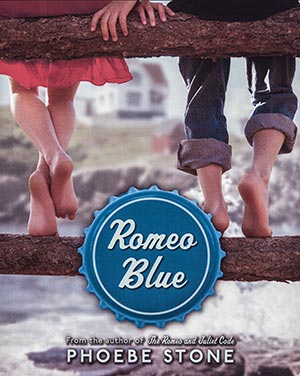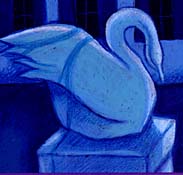|
Romeo Blue by Phoebe Stone |
More Praise for Romeo Blue A NEW novel by Phoebe Stone Young Adult Novel set in Maine will delight readers of all ages
Portland, Maine Press Herald -- Sunday October 22, 2013
Set on the Maine homefront during World War II, this novel is delightful. Author Phoebe Stone wrote it for teenage readers. But this 72-year-old reviewer found it enchanting. You will too. Romeo Blue is the sequel to Stone’s hugely praised “The Romeo and Juliet Code,” a book the Boston Globe called “...quite simply the best novel for young readers... since ‘Harry Potter and the Sorcerer’s Stone.’” But you don’t have to read the first to appreciate the second. Romeo Blue begins with 12-year-old Flissy Bathburn’s first weeks at her American grandmother’s old house overlooking the ocean in fictitious Bottlebay, Maine. Flissy was born in London, and her mother sent her to the Maine family homestead to escape danger posed by German bombs that rain down on London practically daily. But there’s another urgent reason for Flissy’s relocation. Her parents, who speak fluent German, are spies for the Allies with plans to infiltrate the German military. Back in Bottlebay, Flissy’s beloved Uncle Gideon is part of their spy ring and plans to join them overseas. Though Flissy (her full name is Felicity B. Bathburn) dislikes the drafty, wind-blasted Maine house, she’s a happy, high-spirited girl at heart. Soon she’s in love with orphaned Derek, a moody 13-year-old taken into the Bathburn household by Gideon. Flissy, narrator of Romeo Blue, reveals her feelings about Derek early in the book. “He seemed a bit moody today,” she says, “but I rather liked moody. It could be quite dashing when hovering over someone like Derek. I would have followed Derek to the edge of the world, if he had wanted me to. And then perhaps we would have had to hold hands because it must be quite windy at the edge of the world.” As an author, Stone does a marvelous job recreating the wartime years of the 1940s. Haunting songs of the era, clichès used during the war and patriotism evoke the atmosphere. Children and adults darn socks for soldiers overseas. Food is rationed. There are blackouts. Families gather around the radio evenings to hear cryptic broadcasts about the war in Europe. The Bathburn house itself, the stern face of its 19th century founder looking down from a painting on the wall, seems to express the lean the war years, as does the brooding ocean. As Stone’s narrator, Flissy is sensitive to it all. “The water,” she observes, “was all foamy and white and full of worry and wonderment, the waves slapping back and forth in the autumn air. The big, dark rocks along the shore looked almost like large animals crouching...” Early in the novel, Flissy grows upset by Derek’s secret search for his birth father. When reclusive Mr. Fitzwilliam offers to help, she worries about the strange man. Could he be a Nazi spy trying to get information about her mother and father overseas? Flissy begs Derek to tell Uncle Gideon and “The Gram” what he’s up to. But he swears her to secrecy and — feeling about Derek as she does — she’s tormented by conflict. And Flissy has her own family conflict. Is her birth father the man with her mother in Europe? Or Uncle Gideon? Characters in oceanside Bottlebay are well drawn. There’s Mr. Henley, the postman who writes poems that magazines reject. He’s drafted and sent to North Africa, where he writes a series of poems about war. Published in the U.S., his book is a smashing hit. Since its own publication in June, Romeo Blue has garnered wide-ranging praise. According to Booklist, “Stone’s evocative writing sets time and place beautifully... and her passages about war feel relevant today.” Author of at least nine other well-received novels, Stone lives in Middlebury, Vt. She was a recognized painter before turning to children’s literature, her brightly colored work appearing in New England and New York galleries. “Romeo Blue” is suspenseful to the end. It doesn’t sugarcoat war. It has wonderful characters. Stone’s writing shines with great metaphors and similes. Buy this book for your literary teenager. Then you read it. Lloyd Ferriss is a writer and photographer who lives in Richmond. |
|
MORE REVIEWS: Booklist (Starred Review) | Hornbook (Starred Review) Wall Street Journal | Buffalo News | Parent’s Choice Silver Award |
|
Find out more about Phoebe Stone's other novels. Take a look at: |
|
When the Wind Bears Go Dancing What Night Do the Angels Wander? Phoebe's Books | About Phoebe | News & Reviews | The Gallery |
|
Copyright © 2013 by Phoebe Stone |

